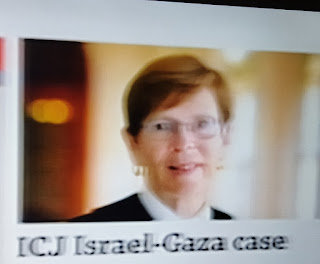The Political Motivations of the International Criminal Court:
A Tale of Two Leaders.
The ICC's perceived selectivity has fueled widespread debates, leading many to speculate about the political motivations driving its decisions. In understanding this apparent double standard, it is crucial to explore the history, mandate, and geopolitical dynamics surrounding the ICC.
The ICC was established in 2002 under the Rome Statute as the first permanent international court created to prosecute individuals for genocide, war crimes, crimes against humanity, and the crime of aggression. Its mandate is clear: to ensure accountability and justice for the worst crimes affecting humanity. However, from its inception, the ICC has faced numerous challenges, most notably from powerful nations that are not signatories to the Rome Statute, such as the United States, Russia, China, and Israel. View Terrace
This exclusion of key global powers has often been cited as one of the major hurdles to the ICC’s effectiveness and legitimacy. Critics argue that the court's jurisdiction is limited, allowing powerful nations to evade accountability while weaker or less influential states are disproportionately targeted.
Putin’s Case: The Russia-Ukraine Conflict
The ICC’s arrest warrant against Vladimir Putin came against the backdrop of the Russia-Ukraine war, which began in February 2022. The charges related to the forcible transfer of children from occupied territories in Ukraine to Russia, an act that international law recognizes as a war crime under the Geneva Conventions. For many, this move by the ICC was a significant step toward holding Russia accountable for its actions in Ukraine, especially given the immense human suffering caused by the conflict.
However, this decision also raised concerns about the ICC's timing and motivations. Critics argue that the arrest warrant was a political gesture, aligned with the broader geopolitical agenda of Western nations. Given the ICC’s dependence on member states for funding, enforcement, and political backing, some suggest that the court may be swayed by the interests of powerful Western countries, which have been vocally supportive of Ukraine and critical of Russia.
Netanyahu and the Israeli-Palestinian Conflict
In contrast to the ICC's actions against Putin, Israeli Prime Minister Benjamin Netanyahu has so far avoided any formal charges, despite long-standing allegations of human rights abuses and war crimes committed by Israeli forces against Palestinians in Gaza and the West Bank. Since its establishment, Israel’s military occupation and settlement activities in Palestinian territories have drawn widespread condemnation from international human rights organizations, including Amnesty International and Human Rights Watch.
In 2021, the ICC announced it was investigating potential war crimes committed in the occupied Palestinian territories, a move that elicited a strong backlash from Israel and its allies, particularly the United States. Netanyahu, in response, denounced the ICC’s investigation as "pure anti-Semitism" and questioned the court’s legitimacy, as Israel is not a party to the Rome Statute. While the investigation is ongoing, no arrest warrants have been issued, leading to accusations that the ICC is selectively applying justice, influenced by political considerations and the backing of Israel by powerful Western nations.view
The Role of Geopolitics in ICC Decisions
The stark contrast between the ICC’s treatment of Putin and Netanyahu highlights a deeper issue: the role of geopolitics in international justice. The ICC is, by design, intended to be an independent institution, immune from political pressure. However, in practice, its actions have often been shaped by the global political environment.
Russia’s global standing and its isolation following the Ukraine invasion have made Putin a viable target for the ICC. Many Western nations, especially those in the European Union and NATO, have imposed harsh sanctions on Russia and supported Ukraine militarily and diplomatically. In this context, the ICC’s move against Putin can be seen as part of a broader effort to hold Russia accountable and isolate it further on the world stage.
In contrast, Israel, despite widespread criticism of its policies toward Palestinians, enjoys robust support from the United States and many European countries. This support has shielded Netanyahu and other Israeli leaders from significant international scrutiny or punishment. The United States, in particular, has consistently opposed any ICC investigations into Israel’s conduct, arguing that the court has no jurisdiction over the country.
Conclusion: The Politics of International Justice
https://porchadvertise.com/vwyvff7av5?key=f2d55dab5b4560305bcb767142549dd8 and its apparent inaction toward Netanyahu raise uncomfortable questions about the fairness and impartiality of international justice. While the court was established to hold all individuals accountable for grave crimes, regardless of their power or position, the realities of global politics have inevitably shaped its decisions.
The ICC’s critics argue that its selectivity undermines its credibility and perpetuates a system in which powerful nations and their allies can avoid accountability. At the same time, the court's defenders maintain that its work, despite its flaws, is crucial in the fight against impunity.
Ultimately, the question of whether the ICC is politically motivated or constrained by global power dynamics is likely to persist. As the world continues to grapple with issues of justice and accountability, the court will remain at the center of these debates, its actions scrutinized for signs of bias or independence. In a world where power often dictates justice, the ICC's challenge lies in proving that it can rise above politics and deliver impartial, fair outcomes for all.
.jpeg)
.jpeg)
.jpeg)
.jpeg)
.jpeg)
.jpeg)














.jpeg)
.jpeg)
.jpeg)